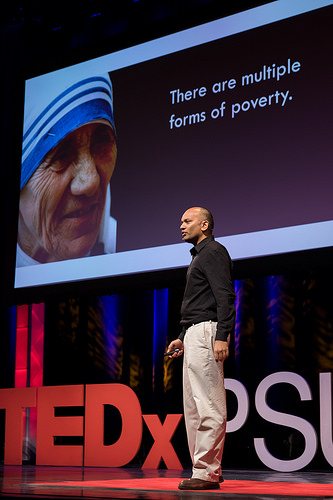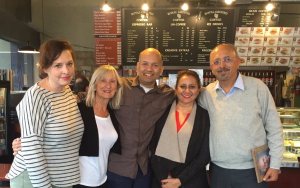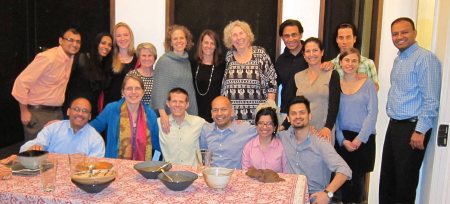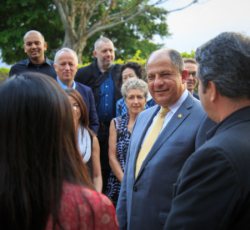Living La Pura Vida, To Be In Service
Just this week, the video of late February’s TedX talks came out: Unlocking Multiple Forms of Capital. It had me reflecting on some recent events, what's been resonating most, and what I've been learning.
 During the slide rehearsal for that talk at Penn State, a volunteer in the back casually asked me, "What are you going to speak about?" I gave him the title of my talk. "Capital? Really?" "What do you mean? Did you expect me to speak on something else?" "To be honest, yes." "Really, on what?" "I don't know, something like love or peace." "Really? How did you figure that?" "I don't know. You just have this energy." We both had to part ways quickly, but that unexpected encounter touched me -- because I've always felt that our values are most deeply communicated without expression, and I would always hope that I'm living the change I talk about.
During the slide rehearsal for that talk at Penn State, a volunteer in the back casually asked me, "What are you going to speak about?" I gave him the title of my talk. "Capital? Really?" "What do you mean? Did you expect me to speak on something else?" "To be honest, yes." "Really, on what?" "I don't know, something like love or peace." "Really? How did you figure that?" "I don't know. You just have this energy." We both had to part ways quickly, but that unexpected encounter touched me -- because I've always felt that our values are most deeply communicated without expression, and I would always hope that I'm living the change I talk about.
For the most part, we size up events by their outer layers, but what I'm learning is that it is our attempts of constant practice that ignite the subtler field of our oneness.
After the event, a teenager came up to me and shyly asked, "Do you think I could meet you personally before you fly out?" I'd have to rush a few things, and meet him right before I fly out. But his sincerity moved me, and I said yes. He brought along another female friend, who also had very little context about our work. After an unexpectedly riveting conversation, she would write me a long email that started with, "I must say that I had the most unexpectedly moving conversation ever. It was like a blow of cold water right when I wasn’t looking." :)
The thing about inspiration is that it flows both ways. It's a co-created field when seemingly disparate fields of presence fuse together.
 Week after Penn State, I remember having coffee with a business school founder in Berkeley. His students had once hosted Karma Kitchen, several of us have spoken to his students, he uses Pavi's talk in his curriculum. Yet it was the first time we were meeting in person. Few others joined in as well, and it was a vibrant conversation. At one point, he asks, "Can I be greedy? Would you have time to speak to this small circle on Friday?" It wasn't an invite from one person to another, but rather something that arose in the space between us. Sure enough, when I connected with his circle, the field still felt alive. Susie, a yoga teacher whom I met earlier, felt it too, as she closed the session: "Every time I hear these human values, I don't know why but I just want to cry."
Week after Penn State, I remember having coffee with a business school founder in Berkeley. His students had once hosted Karma Kitchen, several of us have spoken to his students, he uses Pavi's talk in his curriculum. Yet it was the first time we were meeting in person. Few others joined in as well, and it was a vibrant conversation. At one point, he asks, "Can I be greedy? Would you have time to speak to this small circle on Friday?" It wasn't an invite from one person to another, but rather something that arose in the space between us. Sure enough, when I connected with his circle, the field still felt alive. Susie, a yoga teacher whom I met earlier, felt it too, as she closed the session: "Every time I hear these human values, I don't know why but I just want to cry."
Moving people with ideas and stories seems to be nowhere as strong as this field of presence. There were hardly 30 people at this gathering, and yet it created so many ripples. It don't think it was the messaging, or the messenger, or even our work. It's just the way in which the field is held. That's really what creates the ServiceSpace kind of ripple effect.
The next week, I went to speak to a group of volunteers helping education work in India. Originally, I accepted the invite simply because it came via a friend I had served with in 2005, during our pilgrimage. Relationships are one of my organizing principles. By itself, these invites may fail one's opportunity-cost analysis but nothing is ever by itself. We are in an interwoven field of affinities.
That day, the topic was volunteerism. I got to slide number 2 and never bothered to advance it further. Spontaneously, they chucked their agenda, as did I. I spoke for two hours straight, on rather radical shifts for their ecosystem. Over the last 25 years, they had fund-raised 13 million dollars and donated it to grassroots NGOs -- and here I was, speaking about the power of not fundraising. Yet it was electric. After the event, the organizer fired off a quick note saying, "Nothing less than infinite gratitude. In one line, you have changed our lives forever. The pay it forward chain has already started and that professor (who was in tears, and previously wanted to embark on the million dollar journey) paid for an ice cream at the airport for an anonymous person." That sounds a bit dramatic but it did feel like something significant had emerged in that room. It had changed my life too. I left feeling like I would meet these friends again, in some way, shape or form. When, where, how? I didn’t need to know, because it was all part of the same field.
These are examples from recent events, but ultimately, every interaction starts to feel like a strand of the same kind of tapestry -- the kind that can't be captured in any recording. We think we are doing things for a particular reason, but if we can manage to stay radically open, unexpected threads start to presence themselves.
Week after, I was in Atlanta. If I'm in a particular town, I try to bring together like-hearted people for an Awakin Circle. This time it was at Tim's house. At Emory, he teaches science-based compassion training, via a program supported directly by the Dalai Lama. Guri and I had met him in Italy, and he had joined the Circle in Santa Clara, and was keen to host one in Atlanta. About 25 diverse folks sat in silence for an hour, did a circle of sharing, and I shared some additional stories before dinner. It was pure many-to-many magic. Post dinner, the stories of everyday heroes -- like Elizabeth, who takes middle school student on a week-long homeless immersion -- kept flowing. The next morning, before leaving for Utah, Tim wrote me an email titled, "Wow." Later, he posted Unspeakably Perfect Miracles. In true Awakin Circle style, we had cultivated the field collectively.

The next day, I spoke at a black-tie fundraiser in Atlanta. I don't like fundraisers, but that's why I will do them every so often. :) In front of high powered people -- chairman of Federal Reserve Bank of Atlanta, provost of Emory University, CEOs of companies like UPS and international diplomats -- I focused on ServiceSpace's core learning: "It doesn't matter what currency you give with. What matters most is how you give." Such events inevitably have parts that test my equanimity, :) but it's a nice challenge to explore novel ways to reach these brothers and sisters.
Repeatedly, I arrive at this conclusion: the heart is the best way to reach the head. That night, I spoke of Gandhi, my experience on the pilgrimage, and the power of inner transformation. The former vice-chairman of Citibank came up to gently say, "I've been following ServiceSpace for a while. Please do let me know anytime I can help." An established economics personality came up and said, "As you were speaking, my wife put her hand on mine." Another marketing legend, who has authored 300 research papers and written 30 books, invited me to midnight coffee after the event. On the face of it, a banking chief, or an econ professor, or a marketing guru wouldn't have much in common with me -- yet, it happens because the distance from heart to head is a lot shorter than head to heart. :)
 The day after, that theme continued as I landed in Costa Rica for a Global Well Being Lab dialogue. Among other things, a few of us also interacted with President and Vice-President around the larger context of countering GDP-oriented G7 to well-being economies, WE7.
The day after, that theme continued as I landed in Costa Rica for a Global Well Being Lab dialogue. Among other things, a few of us also interacted with President and Vice-President around the larger context of countering GDP-oriented G7 to well-being economies, WE7.
For me, the lab experience underscored the power of small conversations. During a bus-ride in Bhutan, I ended up having a deep conversation with David Bullon (co-founder of Social Impact Bonds, who now heads the Ministry of Social Innovation in Costa Rica). This time, right as we hugged, David informed me that our Bhutan conversation led him to a 10-day meditation retreat, which is now blooming as a "Mindfulness in Government" movement in Costa Rica.
Love is truly a universal language. At a conference in Costa Rica, we decided to split into small groups, take public buses (not commonly used by locals) and have conversations with strangers on the streets. In my group of four, we decided to step things up :) and do acts of kindness along the way. In the city of San Jose, the capital of Costa Rica, we asked everyday people about "pura vida" ("the good/beautiful/pure life"), whether they could think of non-financial acts of kindness they've given or received, whether they thought of the "other" as a friendly or scary proposition. Then we walked into a cafe and decided to pay-forward for an unsuspecting table. The initial shock of the waiter, the ensuing sense of endearment, the opening of our hearts, the hugs and conversations -- all in Spanish -- made for a memorable experience. Glori, Yara, and Giovanni were so moved, that we did it again at another cafe. Same thing. (Except, this time, they paid for person behind us, and it so happened that person ended up being part of our conference! So they rushed back to say, "No, no, no, not them. Someone else, please." Made for great laughs.)
On the way back to our bus, a filmmaker spontaneously pointed his camera at the three of us for 95 seconds:
What was really touching is that the filmmaker approached me after this short clip. "You know, I wanted to thank you for something." "What's that?" "Two days ago, you were in a circle, and it was one of those tough moments for me, wondering what I was doing with my life. Just then, I saw you sitting in the circle, not doing anything but listening attentively -- and it made me realize that I'm living to be in service."
Costa Ricans have this beautiful, multi-purpose phrase: Pura Vida. The good life. Living la Pura Vida is indeed to be in service. That feels like the common thread across all these recent events. What we do is not nearly as significant and who we become through those acts.
Posted by Nipun Mehta on Apr 18, 2016
SHARE YOUR REFLECTION
6 Past Reflections


On Apr 20, 2016 chris johnnidis wrote:

On Apr 22, 2016 Xiaojuan Shu wrote:

On Apr 24, 2016 Zilong Wang wrote:
:)

On Apr 27, 2016 Kozo Hattori wrote:



On Apr 19, 2016 Jyoti wrote:
Post Your Reply